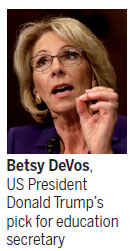Senate support for DeVos weakens
Public refusals on Wednesday by two US Senate Republicans to support Betsy DeVos, US President Donald Trump's pick for education secretary, raised the possibility of a rare congressional rejection of a Cabinet nominee.
In an ominous sign for Trump, Republican senators Susan Collins and Lisa Murkowski said they would not vote for DeVos, a billionaire philanthropist and charter-school advocate.
They would be the first Republicans to break party ranks and vote against one of Trump's cabinet selections.
Democrats, uniformly opposed to DeVos, are expected to oppose her as a block. They would only need for three Republicans to side with them to make DeVos just the 10th cabinet nominee in US history to be rejected by Congress.

Collins and Murkowski also created a possible speed bump in confirming another Trump nominee, that of Alabama Senator Jeff Sessions for Attorney General.
Once Sessions, who was approved by Senate Judiciary Committee on Tuesday, becomes the country's top law enforcement officer, he will have to vacate his seat and can no longer cast a vote supporting DeVos. With voting margins so thin, his departure would put her nomination in peril.
Soon after Collins and Murkowski staked out their opposition to DeVos, the White House said it is confident that she will ultimately be approved.
Senator John Cornyn, responsible for tallying Republican votes in the chamber, was also confident DeVos would be confirmed.
Nonetheless, DeVos' opponents kicked into high gear on Wednesday to press other Republican Senators to vote no when the chamber begins considering the nomination, expected on Friday at the earliest.
"I cannot support this nominee," Murkowski said in a floor speech saying she needed to make her intentions clear to her colleagues.
DeVos' nomination barely squeaked through a Senate committee vote on Tuesday, with both Collins and Murkowski saying they voted yes only so the entire Senate could debate the matter.
Trump's early nominations, primarily for security posts, had an easier time on Capitol Hill than names now before the Senate.
Republicans hold majorities in both the Senate and House of Representatives, but Democrats have been on a blitz to try to block the nominations, often raising concerns about conflicts of interest.


















